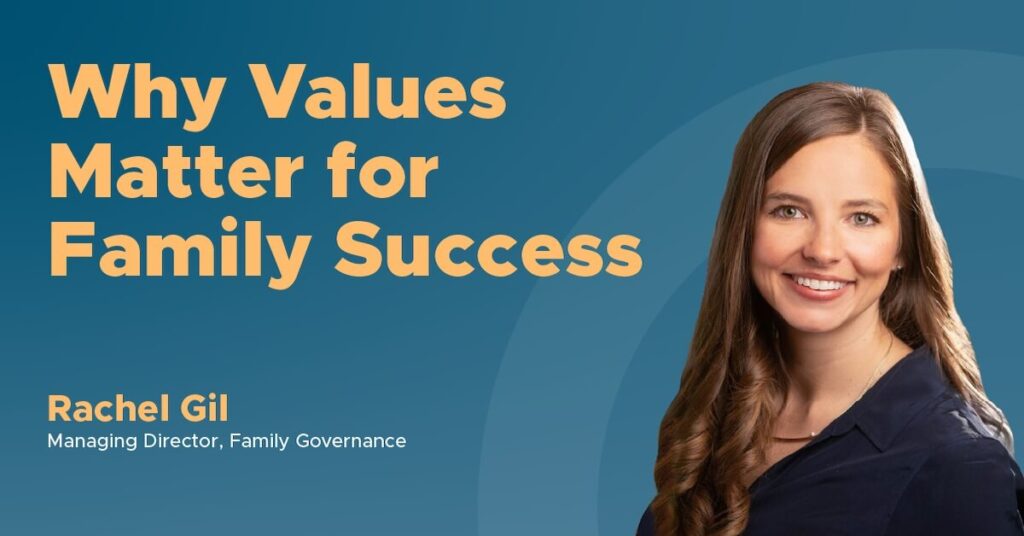
By Rachel Gil, Managing Director, Family Governance
In the world of wealth management, numbers are often front and center—returns, allocations, tax strategies. But for families of significant wealth, one of the most powerful predictors of successful wealth transfer across generations isn’t found on a balance sheet. It’s found in something far more human: culture.
In business, culture is widely recognized as a leading driver of long-term success. According to a Harvard Business Review, 1 companies with strong cultures deliver up to 4x higher total returns to shareholders than those with weaker cultures. If culture can determine the trajectory of billion-dollar organizations, why would it be any less essential for multigenerational families stewarding wealth?
Why Culture Matters
Culture is the architecture that shapes how a family interacts, makes decisions, and resolves conflict. It defines what the family stands for beyond financial capital—its human, intellectual, social, and spiritual capital. It’s what transforms a collection of individuals into a cohesive unit. For families of wealth, culture becomes the connective tissue that helps each generation navigate both the opportunities and the responsibilities that come with financial stewardship.
Best Practices for Establishing or Reinforcing Family Culture
While every family is different, thriving families tend to share a few common practices that help build and sustain culture:
1. Define and Document Core Values
Start with open conversations that explore what matters most to the family. What values drive each individual in the family? Where is there alignment that represents the values of the family? Identifying core values can be done with a values card deck such as this one from 21/64, or ask for a self-led guide from your Cresset advisor. Codify your values into a family motto that becomes the north star for decision-making.
2. Create Rituals and Traditions
Shared traditions—whether annual family vacations, volunteering together, or storytelling dinners—create continuity and belonging. We’ve seen families implement weekly “random acts of kindness,” share a favorite picture via group text message on the last day of the month, or ritualize Sunday family brunch. These traditions reinforce values experientially and provide a sense of rhythm and identity across generations.
3. Hold Regular Family Meetings
Consistent family meetings provide a structured space for discussing everything from shared decision-making practices to philanthropy. Family meetings can be formal semi-annual retreats with extended family and trusted advisors, or weekly informal dinner table chats. Over time, these meetings build transparency, encourage participation, and normalize conversations about money and responsibility.
4. Invest in Education—Beyond Finance
Prepare rising generation family members not just to inherit assets, but to steward them. This includes financial literacy, of course, but also training in communication, leadership, and governance. Explore Cresset’s related resources and consider bringing in coaches or facilitators to support this development.
5. Engage the Rising Generation Early
Involve rising generation family members in age-appropriate shared decisions, such as selecting causes or nonprofit organizations to support, family advisory councils, or investment committees. Create moments during family meetings for cross-generational collaboration and fun, such as competing in an escape room or Amazing Race–style scavenger hunts and challenges. Empower family members to not only participate but take ownership of specific topics and/or portions of the meeting agenda, such as encouraging young family members to share 5 to 10-minute TED style talks at board meetings on topics that are unique to their generation or plan a family volunteer day. Early engagement fosters ownership, decision-making practice, and alignment with family values—long before wealth transfer occurs.
6. Institutionalize Governance, But Keep It Human
Creating structures and policies—such as family constitutions or conflict resolution strategies—helps families plan for and navigate complexity before it arises. The best governance models are grounded in the family’s culture and remain adaptable as the family evolves. Remember, it was once a law in Arizona that donkeys were not permitted to sleep in bathtubs. Don’t allow your families policies to get stuck in the past.
Ultimately, the greatest legacy a family can leave is not a portfolio, but a sense of identity and belonging. When culture is strong and inclusive, wealth becomes a tool for collective impact rather than an instrument for individual entitlement or control.
1 The Leader’s Guide to Corporate Culture
Disclosure
Not an Offer, Recommendation or Professional Advice: This document does not constitute advice or a recommendation or offer to sell or a solicitation to deal in any security or financial product. It is provided for information purposes only and on the understanding that the recipient has sufficient knowledge and experience to be able to understand and make their own evaluation of the proposals and services described herein, any risks associated therewith and any related legal, tax, accounting or other material considerations. To the extent that the reader has any questions regarding the applicability of any specific issue discussed above to their specific portfolio or situation, prospective investors are encouraged to contact Cresset or consult with the professional advisor of their choosing.
Use of Third-Party Information: Certain information contained herein has been obtained from third party sources and such information has not been independently verified by Cresset. No representation, warranty, or undertaking, expressed or implied, is given to the accuracy or completeness of such information by Cresset or any other person. While such sources are believed to be reliable, Cresset does not assume any responsibility for the accuracy or completeness of such information. Cresset does not undertake any obligation to update the information contained herein as of any future date.
About Cresset
Cresset is an independent, award-winning multi-family office and private investment firm with more than $237 billion in assets under management and advisement (as of 1/1/26). Cresset serves the unique needs of entrepreneurs, CEO founders, wealth creators, executives, and partners, as well as high-net-worth and multi-generational families. Our goal is to deliver a new paradigm for wealth management, giving you time to pursue what matters to you most.
https://cressetcapital.com/disclosures/
